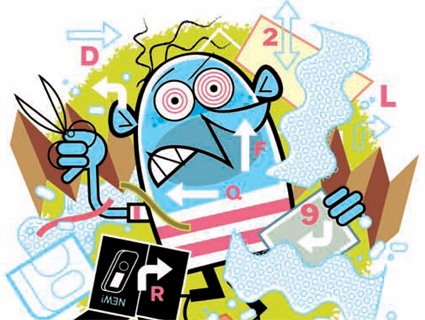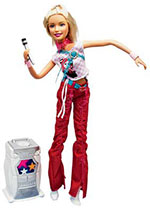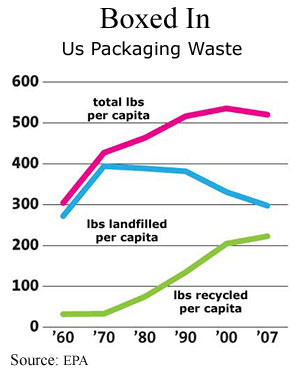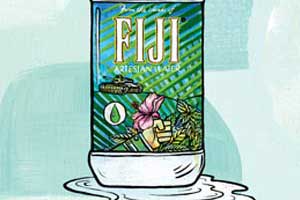
Illustration: Chip Wass; Barbi Photo: Mark Murrmann
Nearly 10% of a typical product’s price is for packaging.
The global packaging market is worth $429 billion.
Nearly 1/3 of Americans’ waste is packaging. Just 43% is recycled after use.
In 2007, Americans threw away 78.5 million tons of packaging—520 pounds per person. That’s a 71% increase from 1960.
A 2008 bill written by Rep. Anthony Weiner (D-N.Y.) would have required the EPA to find ways to reduce packaging waste by 30% in a decade. It died with no cosponsors.
35% of Americans say that they seek alternatives to excessively packaged goods, and nearly 1/2 of consumers worldwide say they’d sacrifice convenience for more environmentally sustainable packaging.
Last summer, Sam’s Club began selling milk in a stackable plastic jug with a smaller energy footprint. It cut the price of a gallon by as much as 20 cents, but consumers complained that it spilled too easily.
Between Thanksgiving and New Year’s, Americans produce more than 1 million tons of additional garbage per week.
If every family reused the wrapping from 3 gifts, it would save enough paper to cover 50,000 football fields.
Holiday waste prompted a British mall to hire a mathematician to devise a formula for using the least gift wrap. The big secret: The wrapping paper should be a little longer than the length of the gift. Its width should be just a little more than the sum of the gift’s width and depth.
“I shouldn’t have to start each Christmas morning with a needle-nose pliers and wire cutters,” said Amazon.com CEO Jeff Bezos as his company started selling products in easy-to-open, “Frustration-Free Packaging” last November.
A year later, Amazon offers the service for fewer than 100 products.
To fight shoplifting, which costs retailers more than $11 billion a year, clamshell packages are designed so that “human hands have great difficulty separating the backing and cover,” according to a 2003 patent.
Even armed with scissors and a box cutter, it took Consumer Reports testers more than 3 minutes to cut open the Oral-B Sonic Complete Toothbrush Kit.
After 99% of her readers said that packages were getting harder to open, the editor of a British magazine for seniors complained, “Hard-to-open packaging isn’t just a dangerous nuisance, it discriminates against the weak.”
Last year, clamshell-type packages sent more than 5,700 Americans to the ER.
Plastic Surgery
Unpacking American Idol Barbie
435 in2 of cardboard (outside box)
385 in2 of cardboard (inside box)
580 in2 of plastic (not including doll and accessories)
45 inches of wire

30 pieces of tape
5 rubber bands
Total pieces of packaging: 55
Time to unwrap: 25 minutes
Tools used: Scissors, box cutter, tweezers, hands, teeth
In May 2008, Sony announced “Death to the Clamshell” with a video of a man getting impaled by a package of headphones.
Sony’s Memory Stick Pro Duo comes in a package that’s 50 times larger than the product itself.
Apple shipped its latest operating system in a box nearly 16 times larger than the DVD case within.
About 1/4 of the weight of a military Meal, Ready-to-Eat is packaging. MREs generate 14,000 tons of packaging waste a year.
Pentagon researchers say that by converting packaging waste into fuel, military units could become energy self-sufficient.
Noting that “packaging plays a psychological role in forming a Warfighter’s opinion of the food inside,” the Pentagon redesigned MRE bags in 2008.
65% of adults say they would drink wine from a pouch. But 61% draw the line at wine in a can.
3- to 5-year-olds are more than 3 times more likely to eat Chicken McNuggets in a McDonald’s wrapper than in a plain one.

More than 80% of kids surveyed said they preferred plastic milk bottles to paper cartons. They saw milk in plastic as “cool” and “fun to drink.” Paper was “old-fashioned.”
In 2005, the cardboard box was inducted into the National Toy Hall of Fame. “Packaging is something that’s accessible to kids,” said the curator.
Frito-Lay has a line of gift wrap, pencil cases, and totes made from old Cheetos and Doritos bags.
When the inventor of the Pringles potato chip can died in 2008, some of his ashes were interred in one of his creations.
In 2005, a coroner’s office in Washington state said it planned to buy a $50,000 machine that would shrink-wrap bodies in case of a disaster or terrorist attack.
Americans annually buy enough plastic wrap to cover Texas.
The USDA has developed edible food wrap. Says a researcher, “Imagine apple-film-wrapped pork chops that go from the refrigerator to the stove, where the film melts into an apple glaze.”
ScentSational Technologies makes plastic packages that emit smells to increase shoppers’ “in-store awareness” of the products inside.
Presliced and wrapped fruits and vegetables cost up to 45% more than whole, unwrapped ones.
A British supermarket recently sold coconuts in shrink-wrap in order to “stop coconut hairs getting into other foodstuffs.”
NXT shave gel comes in a battery-operated blue plastic container with an led that illuminates air bubbles suspended in gel. The New York Times described it as a “miniature lava lamp.”
Bling H2O comes in a corked bottle adorned with Swarovski crystals. Its creator realized “you could tell a lot about a person by the type of bottled water they carried.”
Spotted in Sen. Harry Reid’s office: one of Fiji Water’s silver- plated “Signature Sleeves,” specially designed to hold the square-shaped bottle.
Package Design writes that curvy bottles for diet drinks and pills can suggest weight loss by mimicking “the curves of a slim, slender woman.”
An online recipe for the “calorie conscious” suggests making cheese puffs by mixing biodegradable packing peanuts with cheese powder and salt.
Sales of single-serving snack packs grew by 28% in 2006. On average, these smaller packages cost 2.5 times more per ounce than regular packages.
In 2008, Tropicana downsized its 96-ounce juice jug, but not its price, saying it would “add value” and mean “less gurgling.”
Sales of Patagonia underwear jumped 30% after it removed the packaging.
A Packaging Digest blogger writes, “The battle against overpackaging isn’t about environmental stuff. This is about keeping people from going totally insane.”
Nearly 10% of a typical product’s price is for packaging: “Consumer Choices Can Reduce Packaging Waste,” University of Florida Institute of Food and Agricultural Sciences report, September 2002
The global packaging market is worth $429 billion: “Sustainable Packaging: Environmentally Responsible Packaging for Consumer and Industrial Markets: Market Analysis and Forecasts,” Pike Research, 2009
Nearly 1/3 of American waste is packaging: “Municipal Solid Waste in the United States,” Environmental Protection Agency, 2007
Americans threw away 78.5 million tons of packaging: “Municipal Solid Waste in the United States,” Environmental Protection Agency, 2007
Anthony Weiner bill would have reduced packaging by 30% over next decade: Packaging Reduction Act of 2008
Americans say they seek alternatives to excessively packaged goods: “Sustainable Packaging Report,” Corporate Sustainability International, August 18, 2009
What’s the deal with Sam’s Club square milk jugs: “Sam’s Club Mooves to New Milk Container,” Wal-Mart, June 30, 2008
Between Thanksgiving and New Year’s, Americans produce more than 1 million tons of additional garbage per week: “Commonly Asked Questions: Holiday Waste Prevention,” Stanford Recycling Center; email from Robert Lilenfield, Use Less Stuff Report, September 2, 2009
If every family reused wrapping from 3 gifts: “Commonly Asked Questions: Holiday Waste Prevention,” Stanford Recycling Center; email from Robert Lilenfield, Use Less Stuff Report, September 9, 2009
(Note: Stanford Recycling Center says 45,000 football fields. Lilenfield, who originally came up with the figure 10 years ago, said it would now be about 50,000 football fields based on population trends.)
Holiday waste prompts British mall to hire mathematician to devise formula: “The Science of Packaging,” University of Leicester press release, December 2007
Amazon.com CEO Jeff Bezos quote, as company started selling products in “Frustration-Free Packaging”: “Packages You Won’t Need a Saw to Open,” New York Times, November 14, 2008; interview with Patty Smith, Amazon spokeswoman, August 19, 2009
A year later, Amazon offers the service for fewer than 100 products: Amazon Frustration-Free Packaging official website
To fight shoplifting, clamshell packages are designed so that “human hands have great difficulty separating the backing and cover”: “2007 National Retail Security Final Report,” University of Florida Security Research Project (password protected); “Printed-thermoplastic tamper-resistant package,” United States Patent 6571953
It took Consumer Reports testers more than 3 minutes to cut open the Oral-B Sonic Complete Toothbrush Kit: “The 2007 Oyster Awards,” Consumer Reports, March 2007
After 99% of her readers said that packages were getting harder to open, the editor of a British magazine for seniors complained: “Wrap rage hitting the over-50s,” BBC News, February 4, 2004
Last year, clamshell-type packages sent more than 5,700 Americans to the ER: National Electronic Injury Surveillance System (NEISS) Query Builder, US Consumer Product Safety Commission
In May 2008, Sony announced “Death to the Clamshell” by releasing video: “Sony Declares Death to the Clamshell,” Sony Insider, December 19, 2008; interview with David Migdal, Sony VP of Communications, August 25, 2009
Sony’s Memory Stick Duo comes in a plastic container 50 times larger than product: Interview with Amado Zavala, Sony spokesperson, September 10, 2009
Apple shipped its latest operating system in a box nearly 16 times larger than DVD case within: “Snow Leopard Fails Packaging Test,” TriplePundit, September 8, 2009; email from Nick Aster, Triplepundit, September 9, 2009
Military MREs and their packaging: “Nanotechnology Applied to Ration Packaging,” SSC-Natick press release, June 4, 2004; “Recycling Emphasized During Women’s History Month Program,” SSC-Natick Press Release, April 10, 2009
Pentagon converting packaging into fuel: “Mobile Integrated Sustainable Energy Recovery,” Defense Advanced Research Projects Agency
Pentagon redesigned MRE bags: “Operational Rations of the Department of Defense,” Department of Defense, April 2009
Draw the line at wine in a pouch: “Red or White, but Not as Green as It Could Be,” The Wine Intelligence Briefing, June 2008
McDonald’s branding is successful for kid consumers: “Effects of Fast Food Branding on Young Children’s Taste Preferences,” Pediatrics & Adolescent Medicine, August 2007
Kids think plastic milk bottles are cooler than cartons: “New Look of School Milk: Cold, Plastic and Easy to Open!” School Nutrition Professionals
Kids love to play with packaging: Strong National Museum of Play Inductees
Frito-Lay packaging products: Frito-Lay Snack Chat
When inventor of Pringles potato chip canister died, some of his ashes were interred in one of his creations: “Ashes of man who designed Pringles packaging buried in crisp can,” Guardian UK, June 2, 2008; Obituary for Fredric J. Baur, Cincinnati Enquirer, June 1, 2008; “Pringles Can Designer Buried in His Work,” MSNBC, June 3, 2008
Coroner’s office in Washington said it planned to buy shrink-wrap machine: “Emergency Officials Want to Shrink Wrap Bodies,” The Associated Press, February 19, 2005
Americans annually buy enough plastic wrap to cover Texas: “Waste Facts and Figures,” Clean Air Council; email from Joseph Minott, Clean Air Council, September 8, 2009; Recycling in America: A Reference Handbook (Contemporary World Issues), Debra L. Strong, Debi Kimball, 1997
The USDA developed edible food wrap: “Edible Packaging: Fruit and vegetable wraps preserve foods, add nutrition,” Engineering & Technology for a Sustainable World, November 2001
ScentSational’s in-store awareness: SentSational Technologies
Presliced and wrapped fruits and vegetables cost up to 45% more: “Consumer Choices Can Reduce Packaging Waste,” University of Florida Institute of Food and Agricultural Sciences report, September 2002
A British supermarket sold shrink-wrapped coconuts: “One family, one month, 50kg of packaging. Why?” UK Guardian, January 29, 2006; email from Jessica Wilkinson, Morrisons press officer, September 2, 2009
Shave Gel, or “miniature lava lamp”: NXT Shave Gel; “A Package That Lights Up the Shelf,” New York Times, March 4, 2009
Bling H2O fancy water bottles: Bling H2O
Harry Reid’s Fiji Signature Sleeve: Mother Jones reporter Tim Dickinson’s own two eyes
Curvy bottles help you lose weight: “A Slimming Profile: Should the Shape of Your Package Tip off the Purpose of the Product?” Package Design
Online recipe suggests making cheese puffs from packing peanuts: “Packing Foam,” Lard.net; interview with Denise Peck, StarchTech spokeswoman, September 9, 2009
Sales of snack packs grew 28%: “In Small Packages, Fewer Calories and More Profit,” New York Times, July 7, 2007; “Consumers Pay Hefty Premium for Air, Packaging in 100-Calorie Packs,” Center for Science in the Public Interest, August 14, 2007
Tropicana downsized its juice jug: “The lowdown on downsized products,” Consumer Reports, October 2008; “Tropicana: Please Don’t Squeeze the Customer,” mouseprint.org, June 16, 2008; “US Manufacturers Beat Inflation by Selling Less for Same Price,” the Raw Story, June 26, 2008
Sales of Patagonia underwear jumped 30%: “Patagonia’s Underwear Is Designed for Exposure,” Fast Company TV, June 24, 2009; email from Jen Rapp, Patagonia spokeswoman, August 21, 2009
People are going insane with wrap rage: “The Real Truth About Overpackaging — Version 3.4,” Eye On Packaging blog at Packaging Digest, November 6, 2008
Packaging and products secretly getting smaller: “The Lowdown on Downsized Products,” ConsumerReports.org, October 2008
















